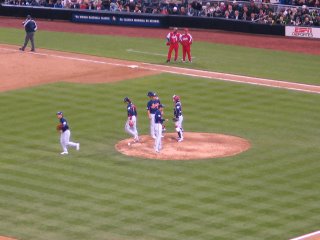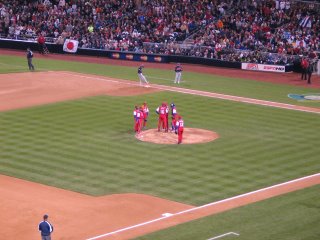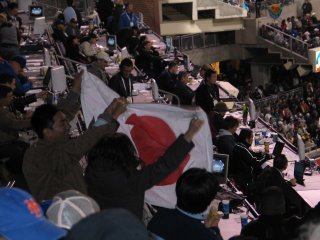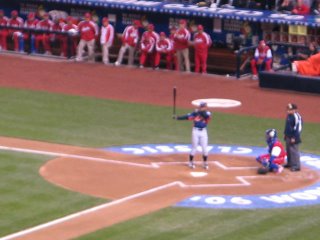Wednesday, April 19, 2006
Tuesday, March 28, 2006
The Globalist: A True World Series
The inaugural World Baseball Classic, the first true world championship, is now history and, to most observers, it was an instant success. The competitive games, fan enthusiasm and high media ratings show that there is a rapidly growing global market for baseball. What was more surprising were some of the outcomes....Read on at:
http://www.theglobalist.com/dbweb/StoryId.aspx?StoryId=5212
Wednesday, March 22, 2006
Postscript
Best handmade sign at the championship final, held up by a fan wearing USA:
"I am here for my country--but where are they?"
Tuesday, March 21, 2006
San Diego's Grand Finale
A final apology to my handful of readers for falling down on the blog in the Classic’s climactic weekend. The easiest excuse is that I was traveling on business all week and using my few spare moments to catch up with my brother in
One of the reasons I had so much to read was the extensive coverage published by Tim Sullivan and others at the San Diego Union Tribune sports desk. They devoted at least four wrap-around pages in each day’s sports section in addition to several front page photos and at least one front page story on the championship.
My brother Zach and I drove from
Rather than repeat so much of the enthusiastic national and international coverage, let me offer a few eyewitness details and a few final observations.
While all three final games managed to draw larger-than-expected crowds (mid to high 30’s is my guess and I have not seen official gate figures), there is no doubt that many ticket holders like myself sort of expected a U.S. appearance in the final weekend. Much of the scalping action we saw had the appearance of
Despite all that was written about ethnic music and cheers, face-paint, and flag-waving, the passionate pockets of fans were not as striking to me as some of the other atmospherics within the stadium. Hearing a variety of national anthems played inside a very American (and very pleasant) new stadium conjured up an Olympic ambience. Seeing all of the flag displays, as well as the WBC video montages for each team, and hearing three simultaneous P.A. translations was also striking. On Saturday afternoon, Spanish was definitely the first language of the stadium. On Monday night, the pleasant voice of the Japanese translator confirmed the global significance of this single game. Add to that the player music between each at-bat--an international mix of Latin salsa and meringue and Asian pop—and it was hard even for white, rhythmically-challenged American fans to avoid swaying in the aisles.
Major League Baseball did a terrific job with the pre- and post-game ceremonies, honoring all of the participating countries and teams and combining streamers, confetti, fireworks, and pageantry to validate the passion and excitement displayed by players on the field. Watching Sadaharu Oh escort Hank Aaron to throw out the finale’s first pitch and Ichiro carrying the Japanese flag in post-game triumph were among the visual highlights.
Between these moments (and during most of Saturday’s semifinal), the actual baseball games were excellent. It would be an overstatement to say they were great ballgames that rank among history’s classics. There was too much sloppy play (nerves?) and too much delay to sustain a dramatic narrative. But each game featured several innings of tight, suspenseful moments, outstanding fielding, clutch hits, and above-average drama. I became a
Despite the aggravating pace of Cuban pitching, which made some innings tedious and others (with multiple pitching changes) seem endless, fans remained extremely engaged in games that only a minority had a vested interest in watching. The combination of curiosity, novelty, normal enjoyment, and commitment to the Classic’s ambitions produced a fan experience that was extremely satisfying. What truly united the spectators of this inaugural world championship of baseball was an appreciation of baseball pure and simple and a willingness to share this experience with an odd mix of spectators and an unprecedented assemblage of the world’s best talent. This may be a self-validating observation, but my brother, who would never indulge undeserved flattery, summed it up well on another chilly March night in
Postgame notes:
Watching the Cuban-Japan handshakes afterward was a nice reminder that sportsmanship at all levels is always worth seeing.
It is surely a function of my station in life, but I noticed an awful lot of fathers and young sons at the games. We were all united in a belief that this was one for the ages and I am quite confident that history will prove us right.
Caps from
Watching Cuba’s ace Lazo put down Albert Pujols, David Ortiz, and Alphonso Soriano—in stituations where all three could have tied the game—was memorable. Ichiro (the lone MLB starter in the final) represented major leaguers well when he delivered when most needed. He hit safely in every Classic game.
The Korean team made no errors in the tournament.
Amidst rumors of a Cuban defection, Zach and I joked that Castro had strict orders for the Cuban coaches: Be sure to bring every pitcher in from the bullpen (using frequent substitutions) by the last out. We wondered if the distance from the home dugout to the bullpen was the furthest some of the Cuban players got from their teammates all wee.
We also wondered if the reason Cuban pitchers slow the game down so much is because they have little else to do and no television breaks to get to.
For historical posterity: second tier tickets to the inaugural semi-final (behind third base) cost $55. The same seats at the championship game cost $60.
Friday, March 17, 2006
Justice for Japan
Apologies to my readers. This was filed late Thursday night, but technical difficulties prevented its timely posting...
Mexico wins, Japanese are in! It's fitting really--the two best Asian
teams and the two best Caribbean teams. A world baseball finale to make
the (non-U.S.) world proud.
This may be a short-term blow to ratings (see today's NY Times for a
great piece on the tv success), but it should ignite good old American
pride. Clearly we did not field the best team and despite every
advantage and break, they lost four, count-em, four times: Canada,
Korea, Mexico, and yes, they should have lost to Japan.
Team USA's only convincing win was against a team of teenagers from
South Africa. It's a good thing they were spared the Dominican Republic
line-up, or Cuba's pitching--the game probably would not have lived up
to the billing.
Good luck next triennial Uncle Sam. You've got three years to assemble a
team.
Thursday, March 16, 2006
Final Four?
Technical difficulties with the blog, but Korea is in and if the US plays as it should tonight, we'll have a dramatic set of matchups in San Diego...the Caribbean battle everyone wanted and a Korea-U.S. rematch with American pride on the line this time.
Wednesday, March 15, 2006
Cub-ilation in San Juan
Bernie Williams goes down valiantly after a tough at-bat, but what a tournament he has had.
The svelte and improved I-Rod goes down swinging...Cuba wins, avenges their drubbing by PR.
Well, one part of my bracket has come to pass: D.R.-Cuba, Saturday morning.
World baseball fan lost in America
Where is a traveler to catch world baseball action when the U.S. Is off?
ESPN? No. Reserved for 30-point NBA blowouts.
The Deuce? No. Heaven forbid we pre-empt early round College SOFTball World Series action.
Network TV? Come on, Luke, you're dreaming.
The answer is online or nowhere. This must be how NASCAR fans feel without SPEED channel.
Wait, wait---thank god for ESPNNews and the Live In-Game Extra feature:
Cuba-P.R. elimination game. Bth inning, bases jammed, 1-run game. John Bracken writes that I-Rod was thrown out of the plate in a previous inning. I just saw a cutaway highlight of Koreans throwing a Team Japan player out at the plate.
Is this the best sporting event anywhere in the world right now? You betcha. So why has ESPNNews just switched back to press conferences with No. 16 NCAA seeds?
Still 4-3 Cuba, I think, but what do I know in my unplugged hotel room?
Preliminary conclusions about the Classic...
...before I lose three out of my four readers to the NCAA's.
1. If you want to imagine a return to baseball without steroids, all you have to do is watch this tournament. Double steals, safety squeezes, all-purpose bunting, hit-and-runs, quick fielding...the rest of the world still plays the full game of baseball. We reward the homerun derby. (Incidentally, who's that skinny guy for Puerto Rico named I. Rodriguez?)
2. If Korea and Japan have proved their right to host Classic games, the next Classic needs to split games evenly between the US, DR, Venezuela, and dare I say Cuba? And what better way to boost Mexico's competitiveness than to put a major league team there?
3. If shortstops were the first Dominican wave in MLB, Daniel Cabrera and Francisco Liriano proved last night that pitchers are the future. Another amazing March game--and a pitching duel at that.
4. Tight games, clutch play, stunning upsets, frenzied crowds, great ratings proved the Classic a great success the first time out. I can't for the life of me understand how spring training exhibitions can get as much press...if not more.
More on that to come...
A pickle of their own making
With Japan's defeat of Mexico, the US needs help (and they've already had plenty) to get to San Diego.
If Japan defeats Korea tomorrow night (and they have a Korea loss to avenge and an officiating wrong to right), the US is eliminated. (But only if Japan scores 7 runs or fewer...got that?)
If Korea (still undefeated) beats Japan again, the US would advance if Clemens can beat Mexico on Thursday.
On the other side of the bracket, the DR took Venezuela down in dramatic fashion (2-1). Tough loss for Luis, Luis Sojo, but form held.
Cuba-P.R. should be wild...I'm rooting for Cuba, Korea, and the U.S. of course to join DR in the semis.




